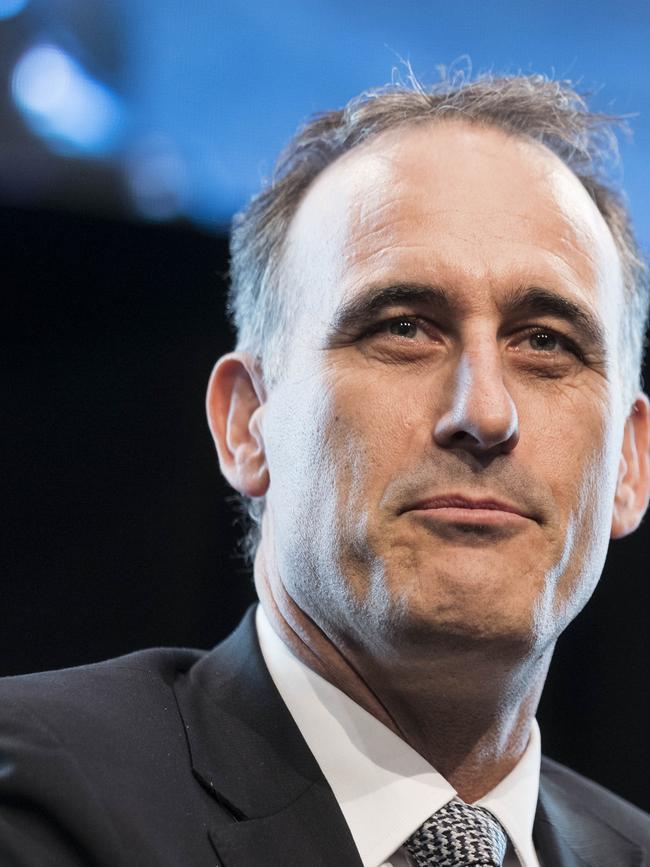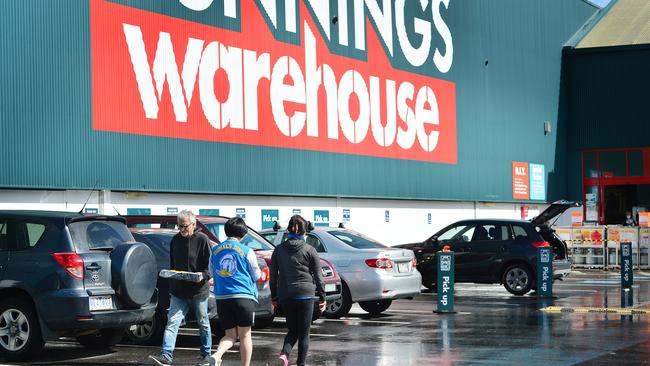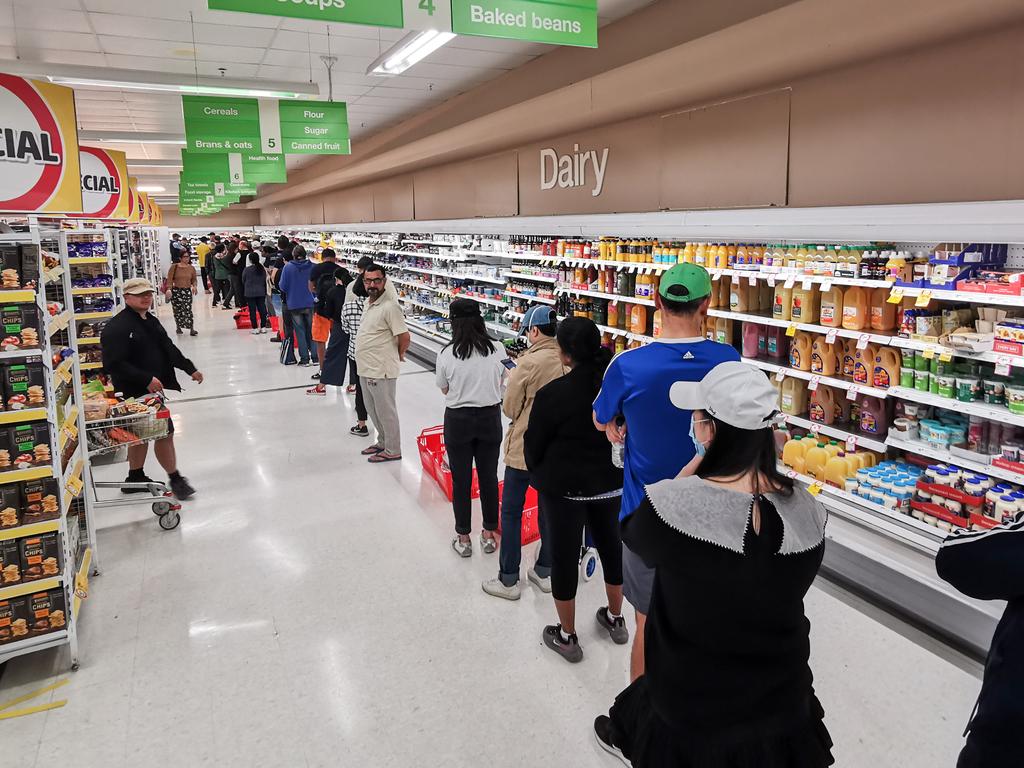Bunnings, Officeworks bonanza not shared across Wesfarmers
All options are on the table for retail problem child Target, which Wesfarmers chief says is ‘not fit for purpose’ for post-COVID-19 retail.

Wesfarmers chief executive Rob Scott says Target earnings have decreased significantly during the national lockdown, saying the retail brand is under review and may undergo significant changes once coronavirus restrictions are lifted.
Mr Scott’s comments came after Wesfarmers issued a trading update detailing the effect the COVID-19 crisis was having on the business and the measures it was undertaking to cope. Wesfarmers said a huge boost in sales at Bunnings and Officeworks may not last, with Kmart already slowing down, that it would undertake a review to find a path for a “commercially viable” Target.
Mr Scott also called for the national cabinet to be preserved once the coronavirus crisis was over, saying it should be repurposed to solve Australia’s looming economic crisis and to drive a program of economic reform..
Target in focus
Australians locked down in their homes have been using the time to work on home projects, repair homes and create and fit out new workspaces, helping drive bumper sales at Bunnings and Officeworks, Wesfarmers reported on Tuesday. But sales at Kmart and Target have begun to moderate, with Target in particular facing shrinking demand, Wesfarmers said.
“In Kmart and Target, sales growth in the third quarter was broadly in line with the levels achieved in the first half of the financial year, supported by strong growth in online sales,” the company said in a statement.
“In recent weeks however, in-store sales momentum has moderated in Kmart and has declined significantly in Target, reflecting the broader decline in customer footfall in shopping centres and ongoing weakness in discretionary categories, particularly apparel. These trends are expected to persist while social distancing and isolation measures remain in place, and while many tenants and activities within major shopping centres are not operating.”
This would mean a hit to the profitability of both Kmart and Target.
“Given the high degree of fixed occupancy costs, a sustained decline in sales momentum will have a material impact on the profitability of Kmart and Target. In recent weeks, margins have also been impacted by higher levels of clearance activity and the increased cost of online fulfilment. While Kmart remains profitable, Target earnings have decreased significantly,” Wesfarmers said.

In an interview with The Australian, Mr Scott warned all options are on the table for what would be the latest in a long line of strategic reviews of its loss-making Target, saying the retailer’s network of stores and store format would not be “fit for purpose” once the world emerges from the coronavirus pandemic.
But he said a new review of Target was unlikely to lead to its complete closure, with a more likely outcome a rationalisation of its store numbers and shrinking the size of its standard store footprint.
“Prior to the coronavirus, if you think about department stores, there was really only one department store in Australia that gets a return, that delivers a return above its cost of capital and that is Kmart.
“It is clear that within Australia and globally there are some structural changes going and disruption affecting department store businesses and COVID has just accelerated some of the pressures and businesses like Target were barely profitable and this is obviously made it unprofitable,” he said.
‘’So from our point of view it is important to face into some of these commercial challenges and that is why we are undertaking a more formal strategic review because we think it is important to find a way to leverage the positives within Target.
“The current network, size of the stores, are not fit for purpose for the future.”
Wesfarmers said further details on the plans and future of Target would be provided prior to June 30 once the strategic review was concluded.
Bunnings bonanza

But while sales at Kmart and Target were moderating, Wesfarmers said it had recorded strong trading at Bunnings and Officeworks over the third quarter and the first three weeks of April. However, it was unclear how long these improved trading conditions would last.
“Given the disruption to usual customer shopping patterns and potential future changes to government measures, it is uncertain whether the higher levels of sales growth will continue for the remainder of the financial year,” the company said in its ASX statement.
And while Kmart and Target were now facing declining momentum, recently-acquired online retailer Catch was doing better, Wesfarmers said.
Wesfarmers said it had taken a number of actions to strengthen its balance sheet during the coronavirus pandemic.
“In recent weeks, Wesfarmers has taken various actions to further strengthen the group’s balance sheet, including the sale on 31 March 2020 of a 5.2 per cent interest in Coles for pre-tax proceeds of approximately $1,060 million.
“This followed the sale on 18 February 2020 of a 4.9 per cent interest in Coles for pre-tax proceeds of $1,050 million.
“In addition, Wesfarmers has also extended its available committed debt facilities by approximately $2.0 billion to approximately $5.3 billion. The extension of debt facilities was secured at acceptable terms, with pricing well below the group’s current overall cost of debt.”
Mr Scott said these actions meant the group had maintained a strong balance sheet and the capacity to withstand and respond to a range of economic scenarios while supporting operating businesses and investment opportunities.
“COVID-19 has had a profound impact on our way of life and business operations and the actions we are taking with our balance sheet and in our businesses are focused on sustaining performance in an uncertain future.”
Keep the cabinet
Speaking on the eeconomy more broadly, Mr Scott told The Australian that the national cabinet formed with the intention of bringing clarity and decision making to the coronavirus issue had proven its worth and would be well equipped to take a leading role in repairing the nation’s economy, as well as implementing crucial economic reform.
This kind of leadership would be key as Australia faces its toughest economic challenges in almost 40 years, he said.
“Although the future is uncertain it is likely we will see much higher unemployment, lower economic growth and we are probably about to embark on the most challenging period economically that Australia has in 30 or 40 years,’’ Mr Scott told The Australian.
“So that in itself provides a catalyst for us to consider reform options and I think there is a really important role for the national cabinet, which has been a really effective way of bringing state and federal leaders together to make key decisions on a timely basis.
“I think there is an opportunity for the national cabinet to work on some of these key reform options to grow the economy on the other side of COVID,” Mr Scott said.
“What has been so effective with the national cabinet is a clarity of purpose and focus and the timeliness of decision making. The reality is that we are all in this together, so the federal government can’t solve all these problems, state governments can’t solve all the problems – it requires a collaborative approach. I think a national cabinet or a similar vehicle could play an important role.’’
Business leaders have called on governments to use the coronavirus pandemic as an opportunity to tackle much-needed economic reform once the health crisis passes. issues including tax reform, industrial relations, GST, superannuation and removing red tape to help accelerate the return to economic growth, should be on the agenda, it has been argued.







To join the conversation, please log in. Don't have an account? Register
Join the conversation, you are commenting as Logout